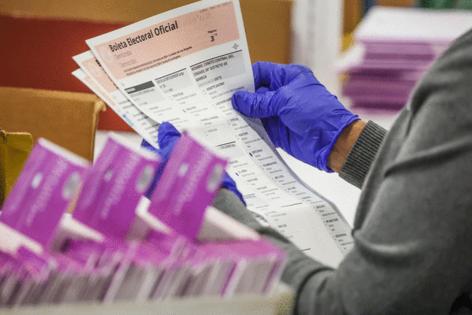Survey shows Californians want ballots in more languages
Published in News & Features
LOS ANGELES — The vast majority of California voters support expanding access to translated ballots for people who speak limited English, an effort that would likely increase turnout, a new poll found.
That finding comes from a poll released Monday by the UC Berkeley Institute of Governmental Studies, which conducted the survey in five languages — English, Spanish, Chinese, Korean and Vietnamese — to capture voter sentiment in a state where more than a quarter of residents are foreign born.
The poll, conducted for the nonprofit Evelyn and Walter Haas Jr. Fund, found that about 70% of California's registered voters agreed that eligible voters who speak limited English should be provided with ballots translated into their preferred language. Support was strong among all age groups, races and ethnicities, as well as among Democrats and independent voters. Republicans were closely divided.
"I think in the country as a whole there's a lot of debate and struggle over how inclusive a democracy we're going to be and a lot of controversy over immigration, immigrant rights, immigrant inclusion," said political scientist Eric Schickler, co-director of the Institute of Governmental Studies. "It's timely just thinking about the question of inclusion of different groups — who feels fully American and is allowed to feel fully American in our political system."
Schickler and others said that, according to the latest estimates, more than 3 million registered voters in California self-identify as limited-English proficient. As of February, just under 23 million Californians were registered to vote.
Under state and federal law, California is required to provide bilingual voting assistance to Spanish speakers. Nine counties — Alameda, Contra Costa, Los Angeles, Orange, Sacramento, San Diego, San Francisco, San Mateo and Santa Clara — must provide voting materials in at least one language other than English or Spanish.
Translated sample ballots and other assistance also must be made available in Spanish or other languages in counties or precincts where the state has determined at least 3% of the voting-age residents are members of a single-language minority and don't understand English well enough to vote without assistance.
The Berkeley survey found that 82% of Democrats supported providing translated ballot materials to limited-English voters, as did 72% of voters registered as "no party preference." Among Republicans, 45% supported providing the translated ballots, while 42% did not.
According to the poll, most California voters also favored a proposal that recently went before the state Legislature that would have allowed all limited-English-speaking communities that meet a minimum threshold in a county to receive translated versions of all voting materials.
Legislation to that effect, SB 266, proposed by Sen. Sabrina Cervantes, D-Riverside, failed to pass out of the Senate Appropriations Committee. A more ambitious bill to expand access to translated ballots and materials, AB 884, passed the Legislature in 2024, but was vetoed by Gov. Gavin Newsom. The governor stated that while he supported expanding ballot access, the bill would have cost tens of millions of dollars not included in the budget.
Providing translated ballots to California voters with limited English proficiency is critical in a state that is home to such a diverse electorate — and is known for its complex state and local ballot measures, said Rosalind Gold of the National Assn. of Latino Elected and Appointed Officials Educational Fund.
"Even folks who are very educated and native-born English speakers find trying to decipher the description of a ballot measure and what it means to be challenging," Gold said.
Providing translated sample ballots and other election materials to voters does not go far enough, she said: The official ballots themselves, whether for Californians who vote by mail or those who vote at polling stations, should be provided in a voter's preferred language.
"It is difficult to basically, kind of go back and forth between the ballot you're going to be marking your choices on and a sample ballot or a facsimile ballot that's in your native language," Gold said. "When people can directly vote on a ballot that is in a language that they are more familiar with, it just demystifies the whole process."
The Berkeley survey found that, among limited-English speakers who lacked access to translated election materials or were unsure if it was provided, 87% said they would be more likely to vote in future elections if they received a ballot in their preferred language. A similar number said receiving those translated ballots would make it easier for them to vote.
The poll surveyed 6,474 registered voters throughout California from June 2-6.
©2025 Los Angeles Times. Visit at latimes.com. Distributed by Tribune Content Agency, LLC.







Comments